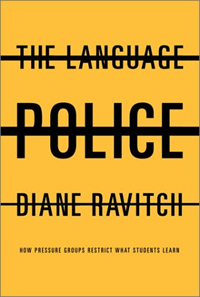I was excited a few years back when Texas legislators suggested using textbook funds to purchase student laptops. I  was less thrilled with the subsequent announcement that the laptops would act as digital textbooks. It is a profoundly bad idea for powerful technology to provide life-support for such a deeply flawed invention as the textbook. Textbook euthanasia is in order.
was less thrilled with the subsequent announcement that the laptops would act as digital textbooks. It is a profoundly bad idea for powerful technology to provide life-support for such a deeply flawed invention as the textbook. Textbook euthanasia is in order.
Textbooks were created before the knowledge economy, and they are based on a distrust of teachers, watered-down standards and a Shock and Awe approach to pedagogy. They are written by anonymous committees and designed for incompetent teachers to use as a script. Literature is bowdlerized, history is sanitized, mathematics is stripped of meaning and science is presented as a bunch of facts. Surely, schools committed to the future can do better.
Textbooks are designed for incompetent teachers to use as a script.
Don’t agree with me? Take a peak inside conservative education critic Diane Ravitch’s new book, The Language Police: How Pressure Groups Restrict What Students Learn (Alfred A. Knopf, 2003):
Textbooks are very important in American schools, especially in history. In most history classes, they are the curriculum…
Today’s literature textbooks are motivated by a spirit of miscellany. … Even when the entries are well chosen and enjoyable, the textbook pokes the reader in the eye with pedagogical strategies. … They are puffed up with instructions and activities that belong in the teacher’s edition. The people who prepare these textbooks don’t seem to have much faith in teachers. The books strive to be “teacher-proof.” They leave nothing to the teacher’s initiative or ingenuity.
Ravitch’s book offers a detailed exposition of the high-stakes world of textbook adoption replete with outrageous censorship, political correctness and dumbed-down, lifeless content. The book is as hilarious as it is horrific.
We can stop censorship. We must recognize that the censorship that is now so widespread in education represents a systematic breakdown of our ability to educate the next generation and to transmit to them a full and open range of ideas about important issues in the world. By avoiding controversy, we teach them to avoid dealing with reality. By expurgating literature, we teach them that words are meaningless and fungible.
… As they advance in school, children recognize that what they see on television is far more realistic and thought-provoking than the sanitized world of their textbooks.
Isn’t it ironic that American taxpayers will pay for new Iraqi school textbooks in order to replace one set of simplistic propaganda with another?
Read a good textbook lately?
Ask yourself if a reasonable person would read a school textbook if not compelled to do so. Then go to your local bookstore and marvel at the wonderful selection of books written with passion and clarity by experts on the topic of your choice. How about building a course around a great book on mathematics rather than a math book?
In the information age, students have unprecedented access to primary materials, including low-tech gadgets like great books and Web sites containing up-to-the-minute information. Any kid worth his or her diploma should be able to find a variety of reliable perspectives and data points online, in the library and at their local bookstore.
The Web offers amazing access to primary sources, yet online textbooks diminish both the Internet and the noble textbook. Every attempt at online textbooks I’ve seen are terrible, and I do not expect they will get much better. McGuffey’s digital brethren tend to offer random links to factoids available on a bunch of pages unintended to connect in any narrative form. Online curriculum publishers often sell content readily available and owned by uncompensated authors. These “texts” manage to be less thoughtful than print textbooks and that is an awfully big concession on my part.
The obsession with textbooks is another indicator of even the most enlightened schools’ preoccupation with information rather than the construction of knowledge. The most noble and effective use of computers is for computing–not looking stuff up. This will require rethinking the nature of learning and teaching, not just adopting a new textbook.
Yes. This will require courage and even more creativity. Breaking textbook addiction with primary sources and activities that engage every learner is cheaper, lighter and pays much higher dividends.
Originally published in the June 2003 issue of District Administration Magazine
Veteran educator Gary Stager, Ph.D. is the author of Twenty Things to Do with a Computer – Forward 50, co-author of Invent To Learn — Making, Tinkering, and Engineering in the Classroom, publisher at Constructing Modern Knowledge Press, and the founder of the Constructing Modern Knowledge summer institute. He led professional development in the world’s first 1:1 laptop schools thirty years ago and designed one of the oldest online graduate school programs. Gary is also the curator of The Seymour Papert archives at DailyPapert.com. Learn more about Gary here.

I wouldn’t say I will not miss textbooks, but if being paperless will, to some degree make learning easier and say, “long-lasting” then I would say goodbye to textbooks.